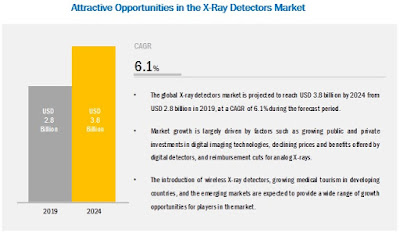According to research report the global X-Ray Detector Market is projected to reach USD 3.8
billion by 2024 from USD 2.8 billion in 2019, at a CAGR of 6.1% during the
forecast period. Market growth is mainly driven by the growing public and
private investments in digital imaging technologies, declining prices and
benefits offered by digital detectors, and reimbursement cuts for analog
X-rays.
The X-ray detectors market is projected to reach USD 3.8
billion by 2024 from USD 2.8 billion in 2019, at a CAGR of 6.1%. Market growth
is largely driven by growing public and private investments in digital imaging
technologies, declining prices and benefits offered by digital detectors, and
reimbursement cuts for analog X-rays. The introduction of wireless X-ray
detectors, growing medical tourism in developing countries, and the emerging
markets are expected to provide a wide range of growth opportunities for
players in the market. On the other hand, the high cost of digital X-ray
systems is a major factor limiting market growth.
The X-ray detectors market is highly consolidated in
nature with several big and emerging players. Prominent players in this market
include Varex Imaging Corporation (US), Thales Group (France), Canon, Inc.
(Japan), Konica Minolta, Inc. (Japan), Teledyne DALSA Inc. (US), Fujifilm Holding
Corporation (Japan), Agfa-Gevaert Group (Belgium), Carestream Health (US),
Vieworks Co., Ltd (South Korea), Hamamatsu Photonics K.K. (Japan), Analogic
Corporation (US), and Rayence (South Korea). These players have adopted various
strategies such as acquisitions, partnerships, collaborations, and product
launches to further expand their presence in the
global X-ray detectors market. Acquisitions were the key growth
strategies adopted by top players such as Varex Imaging Corporation (US), Canon,
Inc. (Japan), Konica Minolta, Inc. (Japan), and Agfa-Gevaert Group (Belgium) from
2016 to 2018.
Download PDF
Brochure: https://www.marketsandmarkets.com/pdfdownloadNew.asp?id=7004984
Varian Medical
Systems dominated the X-ray detectors
market in 2018. The company has managed to create a unique identity in this
market due to its robust product portfolio and large geographic presence. In addition, the company also focuses on
organic and inorganic growth strategies such as expansions, acquisitions, and
agreements. For instance, in December 2016, the company acquired PerkinElmer's
medical imaging business (US), a manufacturer of diagnostic imaging products.
The company also focuses on geographic expansions to maintain its leading
position in the market. For instance, in March 2016, the company opened the Wuxi
Regional Service Center in China.
Trixell (Division of Thales Group) is among the major
player in the X-ray detectors market for FPDs. It is a joint venture of Philips
Medical Systems, Siemens Medical, and Thales Electron Devices. The company‘s large
market share is attributed to its exhaustive product portfolio of X-ray
detectors. The company has been active in the market for more than 15 years and
is a pioneer in WiFi FPD technology. The company believes in investing in
product development and strengthening its solutions-based business. For
instance, in November 2016, the company launched the Pixium Portable 3543 DR detector.
The innovation-centric company invests heavily in R&D to maintain its
market share. It invested USD 912.1 million and USD 812.0 million in R&D in
2017 and 2016, respectively.
No comments:
Post a Comment